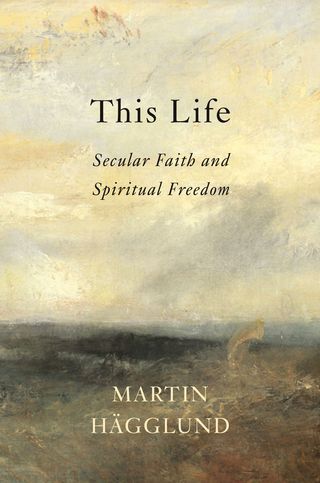Religion
Want Eternal Life? Are You Sure?
Martin Hägglund’s new book, This Life, considers a fate worse than death
Posted February 19, 2019
Eternal life sounds great, right?
After all, it means no death, no fear of death, no worrying about losing loved ones. It means having an endless amount of time – literally -- to enjoy or pursue any and every thing you could ever imagine. No wonder the major world religions, such as Christianity and Islam, promise eternal life to their devout adherents. And Christianity and Islam aren’t the only religions that offer eternity as the promised goal attainable once this earthly experience ends. Bahaism, Mormonism, and many Eastern religions also present a similar premise: This limited life, full of pain, suffering, loss, and death, is only a temporary plane of mortal impermanence. If you play your cards right, then after you die, you’ll get to the real show characterized by immortality: eternal life, unbound by the precariousness and limits of time.
It is understandable that religions offer a promise of eternal life. After all, death is the most horrible, tragic, crushing, and painful thing that we ever contend with. It is an unavoidable source of worry, fear, dread, and sorrow. As famous anthropologist Bronislaw Malinowski observed, “Of all sources of religion, the supreme and final crisis of life – death – is of the greatest importance.” Or as prominent sociologist Peter Berger more eloquently expressed it, “The power of religion depends, in the last resort, upon the credibility of the banners its puts in the hands of men as they stand before death, or more accurately, as they walk, inevitably, toward it.”
How comforting, then, to believe that after we die, we can enjoy immortality, as the world’s religions promise.
But have you ever really thought about the actual implications of eternal life? I mean, really thought about them, deeply? If not – or even if you have – I strongly recommend Martin Hägglund’s newest book, This Life: Secular Faith and Spiritual Freedom. In addition to being beautifully written and unabashedly life-affirming, it is also, by far, the most profound, thoughtful, compelling, and insightful book I have ever read on the topic of immortality, and the problematic implications of the religious fixation on eternal life. For a secular person – or anyone who wants to understand the secular worldview – this book is essential reading.
According to Hägglund, eternal life would actually be terrible. It would entail an ever-expanding vortex of emptiness. A gaping, bottomless pit of meaninglessness. It would spell the end of caring, the end of hoping, the end of appreciating, of celebrating, of exerting, of accomplishing, of committing, of loving. It would mean despair beyond despair. Indeed, a fate worse than death.
First off, eternity is actually hard to conceive of or logically imagine, if not impossible. Eternity does not mean a really, really, really long time. Rather, it actually means the end or absence of time: no beginnings and no ends. Think about that. In such a situation – which I find even impossible to really wrap my brain around – there is no reason to commit to anything or start or stop anything because starting and stopping require time. But with endless time, they don’t make much sense. As Hägglund explains, “there cannot be any meaningful activities in eternity, since nothing can live on in a timeless presence and nothing can matter in an everlasting existence” (pg. 29).
Second, eternity would mean the end of caring. The truth is, we care about things because we know they can or might end. It is the very precariousness and finiteness of life that make our relationships matter, that make our endeavors worthwhile, that make our experiences meaningful, that make our commitments important. Aa Hägglund explains, if your life could never end “you would never be able to ask yourself what to do with your life, and you could never sacrifice your life for something that mattered more to you than your own existence. Most fundamentally, you would have no horizon of death against which you could give any direction to your life” (pg. 203).
Third, if everything and everyone just went on and on forever, all would become nothingness. For the sake of illustration: imagine going to Disneyland with your family, or enjoying an orgasm with someone you love, or making a sculpture with all of your heart, or surfing the perfect wave, or having a wonderful conversation, or hiking in the quiet woods – imagine doing any of these things forever. Imagine experiencing any of them without end. They would lose all of their joy, all of their wonder, all of their meaning. In fact, they would become hellish if they continued to be experienced on and on, eternally. It is the time-bound reality that such experiences start and stop, that they can’t always be achieved or experienced, that they are haunted by impermanence, that they are necessarily limited, that gives them their sweetness.
In short, it is the unavoidable reality of all of life’s relationships and experiences coming to an end that makes them meaningful. “Life can only matter,” Hägglund explains, “in light of death” (pg.181). It’s an old insight, to be sure – but Hägglund plumbs its depths like no one has ever before. He does so artfully, theoretically, and with tremendous wisdom. This Life is a truly welcome addition to the secularist humanist canon.
The notion of “secular faith” plays a prominent role in Hägglund’s treatise. While I at first chafed at the term -- it seemed like an oxymoron – Hägglund explains what he means. To have secular faith “is to be devoted to a life that will end, to be dedicated to projects that can fail or break down…to be dedicated to persons or projects that are worldly and temporal.” In other words, I know my wife will die one day – and she may even leave me, for whatever reason. But I remain devoted to her, none the less, in the here and now. That is an exercise of secular faith. I know that all my family and friends will die, sooner or later. But that only increases my commitment to them.

I know that this earth is perishable, but that only strengthens my care and concern for it. And as Hägglund makes clear, even the most religious people share this orientation of secular faith, whether or not they care to admit it. For as Mark Twain once quipped, if Christians really and truly believed what their religious faith purports, they would be crying at births and dancing at funerals. But they don’t. Like all of us, they feel joy at the coming of new life, and pain and sadness at life’s end. That’s because there is deep and unavoidable meaning in finiteness and impermanence.
It’s infinity and eternity that are truly hollow -- and thus meaningless.




